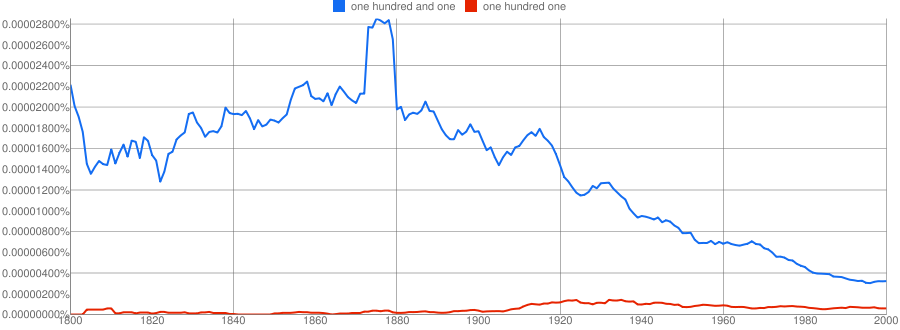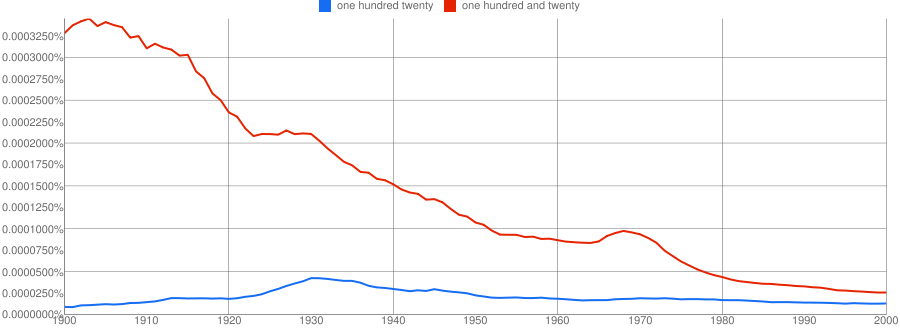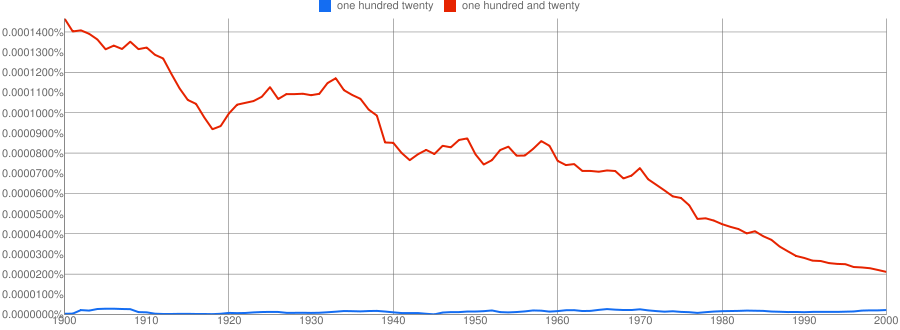American math text books and math manuals (e.g.: Math At Hand published by Great Source Publications) tell students that they don't say 'and' as they are speaking a number.
From page 5 of that text:
How would you read 905,346,521?
Say: nine hundred five million, three hundred forty-six thousand, five hundred twenty-one.
That is an American text.
As a British person, I find this cumbersome and I am sorry, but very American.
I now live in Canada and a teacher told me recently that 120 must be pronounced 'one hundred twenty', because if children say 'one hundred and twenty' then it means one hundred POINT 20.
Of course I said that it does not. In fact, either with the 'and' or without is acceptable, but 'and' does not mean 'point'. The teacher tried to tell me that it did.
This is worrying for what is going to go down the line in our kids' education and declining numeracy abilities. Additionally, we don't say 'twenty' after the decimal point, we say 'point two zero', or better yet, 'point two'. You can put as many zeroes as you like after a decimal digit with a value and it doesn't change its value. 0.1 is the same as 0.1000000. So don't bother with the extra zeroes.
American math manuals and teachers seem to want to express the decimal fraction in terms of relating it to the place value chart, so a decimal part is named so many tenths or hundredths or thousandths or ten thousandths or hundred thousandths or millionths. Really? It is essential to understand the place value chart, but if you express a decimal number as a fraction you are going to get a bunch of kids stopping in their tracks in confusion. I looked on the web this morning and there are some people actually saying that 1.2000 is 'one and two thousandths'. Really? Why not bung in another few zeroes and decide to call it 2 millionths instead? I kid you not. People, if you're going to teach it, you'd better understand it.
I believe it is acceptable to choose to say 'and' or not in your expression of numbers - either is fine but as a British person I always say 'and' when speaking a number such as 1,256. However a decimal point must ALWAYS be clearly stated as either 'point' or you could say 'decimal'. Anything else will cause confusion. Following a decimal point, each digit is to be read individually: 1.234 is said aloud as 'one point two three four'.
It leaves no room for ambiguity or mistake. Bottom line.
If a student is given a mixed number or mixed fraction (same thing, slightly different name) such as 57 20/100 (fifty seven and twenty hundredths) then you say it as a fraction, using 'and', as I just wrote it in words.
However, when you transform that fraction into a decimal number kids should first reduce it (so they can comprehend it better) and twenty hundredths is actually the same as two tenths, so the number becomes 57.2
Knowing the place value, you know that the first column after the decimal point is tenths, the second column is hundredths the third column is thousandths. If you have two hundredths, the two belongs in the hundredths column (col. 2), but two tenths, the 2 belongs in the first column.
There is lots of room for confusion if you don't know what you are doing, and trying to tell kids that 'and' means 'decimal point' is one big fat way of adding further to the confusion they are going to have. Teachers: please don't do that.




100.35.